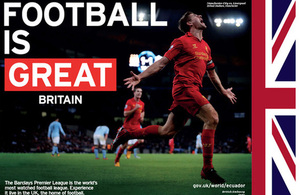A Football Series: Blog 1
Professor Mathew Brown is visiting Ecuador to discover the history of football and its South American roots.

Why did Ecuadoreans start playing football later than most other South Americans? In Buenos Aires, the first football matches took place in the 1860s. In Brazil and Chile, in the 1890s. (I’ve just published a blog on the famous Brazilian-Briton Charles Miller, who organised the first football league in Brazil). But in Ecuador ‘foot-ball’, as its first practioners called it, in English rather than the Spanish variant fútbol, didn’t develop until the twentieth century was well on its way.
Could it be because of the late arrival of modernity to Ecuador, compared with Argentina, Brazil or Chile? Or is the explanation the relatively small size of the British community here, the lack of sports obsessives in the late nineteenth-century who would have set up competitive teams and leagues? A final hypothesis is that the strong legacy of Spanish colonial culture in Ecuador, in sporting terms expressed in bullfighting and cockfighting, that delayed the adoption of football and made cricket an unnecessary luxury.
I have come to Quito to research these questions. My book on the modern history of Latin America – From Frontiers to Football: An Alternative History of Latin America since 1800 (London: Reaktion, 15 July 2014) is about to come out, and I want to deepen my knowledge of a subject that wasn’t resolved in my previous work. How do we explain the sporting development of South America? Have historians over-estimated British influence? How important in the development of sporting competitions is national railway infrastructure (which arrived relatively late to Ecuador, of course)? So far I have been in Chile, Peru and Brazil working on this project, thanks to the financial support of the British Academy, CONICYT, LUDENS and my own institution, the University of Bristol. Now I have come to Ecuador for three months to investigate the Ecuadorean case, which is often ignored by historians thinking comparatively about South America. I am here with my family, and my children are preparing to support their two teams in the World Cup – England and Ecuador.
The history of sports, football and World Cups is significant on its own, of course, but the study of cultural history helps historians to understand other social, political and economic processes too. Sometimes sport reveals aspects of history that don’t emerge so clearly from other surviving sources, as I have written recently in the Financial Times. If anyone reading this blog knows of an Ecuadorean social or sporting club – for tennis, football or other recreations – that has a historical archive that I might consult, and which might shed some light on this subject, then I would be delighted and grateful. Ecuadorean archives can help us to understand better the role of the British in the global origins of modern sports.
Dr Matthew Brown
Reader in Latin American Studies
University of Bristol
Email: Matthew.brown@bristol.ac.uk
Twitter: @mateobrown